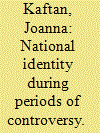| Srl | Item |
| 1 |
ID:
120363


|
|
|
|
|
| Publication |
2013.
|
| Summary/Abstract |
Cinco de Mayo, celebrated by Mexican Americans as well as Americans of other ethnicities, provides an opportunity to examine the influence of ethnic festivals on broader US identity. Given the recent controversy over the immigration bill, State Bill 1070, passed in Arizona in 2010, the themes presented in newspaper articles concerning the celebration of the holiday in Phoenix, Arizona (2006-11) and the public response to these articles are examined. This examination reveals the intense contestation associated with the presentation of symbols and themes of national identity during periods of political controversy. It also illustrates that ordinary people have strong, long-standing opinions about the future of the nation and national identity and will express their opinions when an outlet is provided to them
|
|
|
|
|
|
|
|
|
|
|
|
|
|
|
|
| 2 |
ID:
152525


|
|
|
|
|
| Summary/Abstract |
Through an examination of two festivals – Qing Ming and Cap Go Meh – in the town of Singkawang in Indonesian Borneo (Kalimantan), we show how Singkawang-bound Chinese Indonesian tourists and their Singkawang-based relatives produce a diasporic heritage network through ‘moorings’ generated by both transnational and internal migration. Instead of returning to a singular ‘homeland’ in distant China, these tourists return to Chinese-majority Singkawang as a result of their personal genealogical roots and of their broader cultural allegiance with a kind of Chinese-ness that Singkawang has come to represent within a post-Suharto Indonesia. Through these two festivals, we demonstrate how personal heritage practices like ‘roots tourism’ and visiting friends and relatives are intimately bound up with identity and developmental politics at local, national and international scales. In so doing, we identify a range of ways in which migratory and tourism flows by Chinese Indonesian internal migrants shape relations to their ancestral hometowns and cultural ‘homelands’ in Indonesia within the context of membership to and participation in a broader transnational diaspora.
|
|
|
|
|
|
|
|
|
|
|
|
|
|
|
|